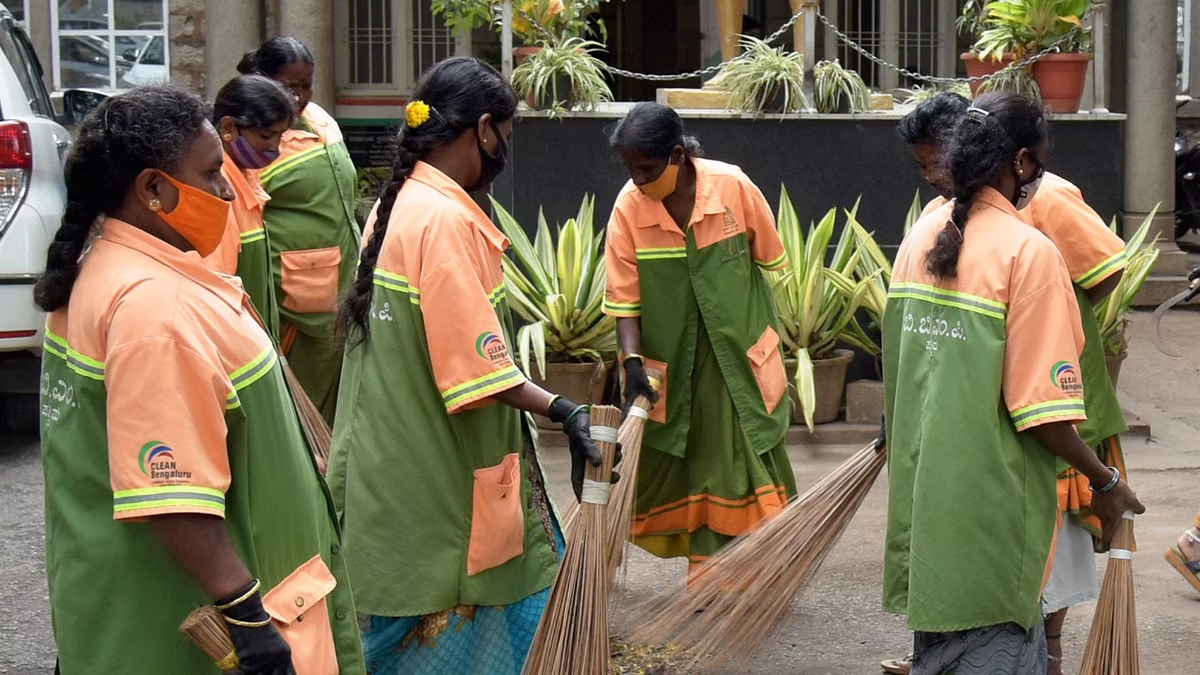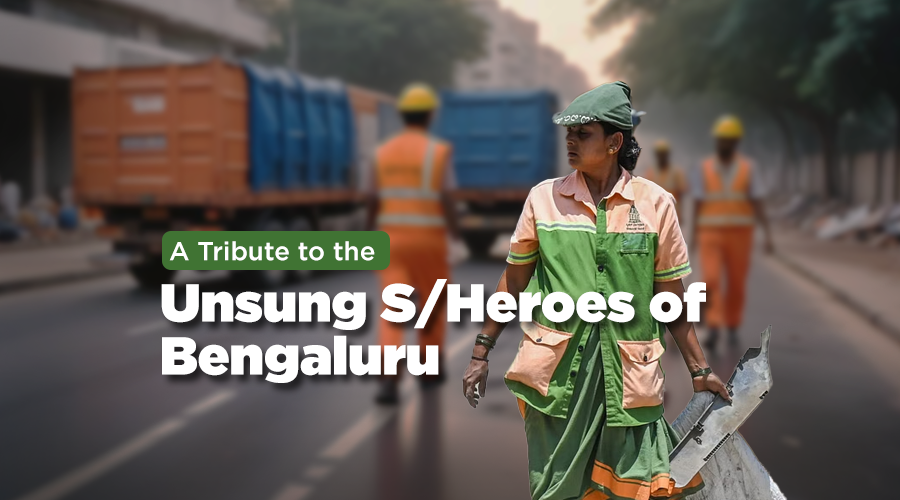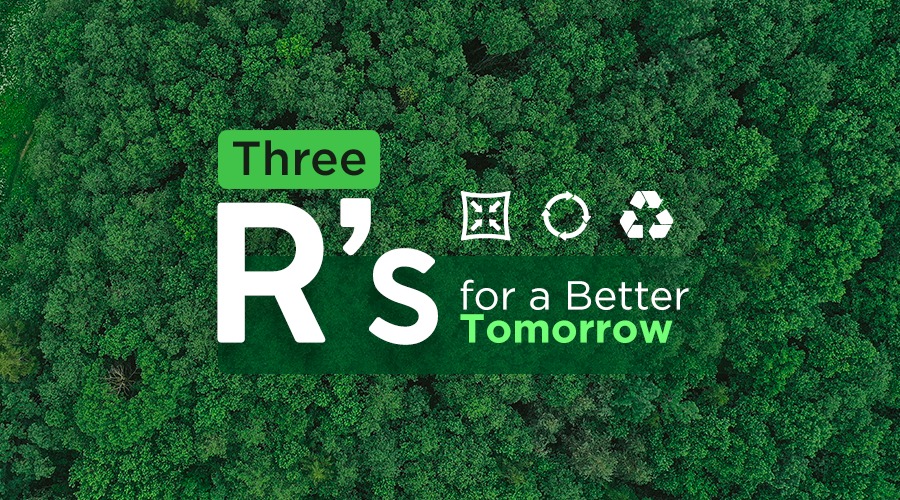 Image source: Deccan Herald
Image source: Deccan Herald
Bengaluru, the vibrant tech and start up capital of India, pulsates with energy and innovation. Yet, beneath the gleaming glass facades and bustling streets lies a crucial, often unseen, network that keeps the city clean – the Pourakarmikas and sanitation workers. These unsung heroes are the informal backbone of Bengaluru’s cleanliness, working tirelessly to ensure a healthy and hygienic environment for all.
The Invisible Hands of Cleanliness
Pourakarmikas and Sanitation Workers are the backbone of Bengaluru’s solid waste management system. They sweep streets, collect segregated waste from homes and commercial establishments, and often brave harsh weather conditions to keep the city functioning. Sanitation workers, including drain cleaners and sewage system maintainers, perform equally essential but often more hazardous tasks, ensuring the smooth flow of waste and preventing outbreaks of diseases.
Their Contributions: Beyond Just Sweeping
The work of Pourakarmikas and sanitation workers extends far beyond just sweeping streets. Here’s a glimpse into their multifaceted roles:
Door-to-door waste collection:
One of the primary responsibilities of Pourakarmikas is the door-to-door collection of segregated waste from households. By collecting waste directly from homes, they ensure that waste is properly segregated into wet and dry waste categories. This segregation is critical for effective recycling and composting, reducing the overall burden on landfills. Pourakarmikas often start their rounds early in the morning, navigating narrow streets and crowded neighborhoods to ensure timely collection.
Street cleaning:
In addition to waste collection, Pourakarmikas are responsible for cleaning the streets of Bengaluru. This task involves sweeping streets, sidewalks, and public spaces to remove litter and debris. Street cleaning is essential not only for the city’s aesthetics but also for public health.
Drain cleaning:
Another critical aspect of their work is cleaning drains and sewage systems. Blocked drains can lead to waterlogging, especially during the monsoon season, causing significant inconvenience and health risks. Pourakarmikas clean clogged drains to ensure the smooth flow of wastewater, preventing overflows and the spread of waterborne diseases. This task is particularly challenging and hazardous, as it involves dealing with foul-smelling sludge and potentially toxic substances.
Disinfection:
The role of Pourakarmikas becomes even more crucial during health crises, such as the COVID-19 pandemic. During such times, they are tasked with disinfecting public spaces, including markets, parks, bus stops, and other high-traffic areas. This disinfection process involves spraying disinfectants and cleaning surfaces to eliminate harmful pathogens and reduce the spread of the virus.
Fumigation during seasonal outbreak:
Pourakarmikas and sanitation workers play a critical role in combating seasonal outbreaks like dengue through diligent fumigation efforts. These dedicated workers are essential in controlling mosquito populations, which are primary carriers of the dengue virus. Utilizing mosquito repellent gas in specialized vehicles, they tirelessly work in various public and residential areas, ensuring thorough coverage to prevent the spread of the disease.
Waste segregation education:
Beyond their physical tasks, Pourakarmikas often act as educators within the community. They play a key role in raising awareness about the importance of waste segregation and proper disposal habits. Through their interactions with residents, they educate people on how to separate organic waste from recyclables and non-recyclables.
Challenges Faced by Pourakarmikas and Sanitation Workers
Despite their vital contribution, Pourakarmikas and sanitation workers face a multitude of challenges:
1- Low wages and precarious employment:
Most are employed on contract basis with minimal wages and limited benefits like healthcare and social security.
2- Lack of proper equipment:
Often, they work with inadequate or outdated tools and uniforms, putting their health at risk.
3- Unhygienic working conditions:
They are exposed to hazardous materials, dust, and pathogens, leading to respiratory illnesses and skin problems.
4- Social stigma:
Their profession is often ostracized, leading to a lack of respect and dignity.
Long working hours: They work extended shifts, leaving little time for rest and family life.
The Need for Better Support: Policies and Initiatives
Recognizing their crucial role, there’s a growing need for policies and initiatives to improve their lives. Here are some key steps:
Enhancing Working Conditions
Improving the working conditions of Pourakarmikas is imperative. This includes providing adequate protective gear, regular health check-ups, and ensuring safe working environments. Modernizing equipment and tools can also make their tasks less labor-intensive and more efficient.
Fair Compensation and Benefits
Ensuring fair wages, timely payments, and access to benefits such as health insurance, pensions, and paid leave are critical for their financial stability and job satisfaction. Employing pourakarmikas as permanent staff rather than on a contractual basis can provide the job security they need.
Recognition and Respect
Recognizing the contributions of Pourakarmikas and treating them with respect is essential. Public acknowledgment of their work, awards, and celebrations of their efforts can boost their morale. Changing societal attitudes through awareness campaigns can reduce stigma and foster a more inclusive community.
Social security schemes:
Implementing schemes that provide for their retirement and ensure their well-being beyond their working years.
Beyond Policies: A Shift in Mindset
Beyond policy changes, a shift in societal mindset is necessary. Here’s how we can all play a part:
– Treat them with respect: A simple greeting and acknowledgement can go a long way in recognizing their dignity.
– Segregate waste responsibly: Following proper waste disposal practices makes their job easier and contributes to a cleaner city.
– Advocate for their rights: Raise awareness about their challenges and support initiatives that aim to improve their working conditions.
B.PAC Celebrates these Unsung Heroes
The contributions of Pourakarmikas and sanitation workers are often overlooked. Recognizing their dedication and advocating for their well-being is not just about policy changes, but about creating a city that values the people who keep it clean. In this spirit, B.PAC, in collaboration with Mazumdar Shaw Philanthropy, conducts an annual Deepavali sweet distribution initiative to express gratitude to all BBMP Pourakarmikas and sanitation workers from 198 wards. This gesture acknowledges their unwavering hard work, dedication, and commitment to maintaining the cleanliness of Bengaluru. The Pourakarmikas and sanitation workers are always delighted to receive sweet hampers, and their expressions of gratitude resonated with the acknowledgement and respect shown for their tireless efforts throughout the year.
Call to Action
The work of Pourakarmikas and sanitation workers extends far beyond just sweeping streets. Their multifaceted roles are crucial for maintaining the cleanliness, health, and sustainability of Bengaluru. Despite the significant challenges they face, their contributions remain invaluable. It is imperative that we recognize their efforts, provide better support, and foster respect for these essential workers. By doing so, we can ensure a cleaner, healthier, and more equitable city for all.





